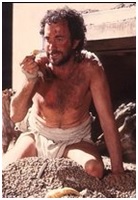|
 |
|
 |
Shakespeare's Timon of Athens - Money and
Ethics
Timon of Athens
Key characters Timon, an Athenian lord. Flavius, Timon’s head servant. Alcibiades, Athenian general Apemantus, philosopher.
Fun facts • Written in 1607-8 immediately after Othello, King Lear and Macbeth. • Set in ancient Greece
The story Timon’s immense wealth and generosity are famous throughout Athens Timon:
Apemantus, a philosopher, warns him that money isn’t everything and can easily be lost. In fact, unbeknown to himself and everyone else (except his head servant, Flavius), he is heavily in debt. His creditors demand repayment, and Flavius tells him he hasn’t enough money. Unworried Timon thinks his friends will help him out, but they don’t. He then visits his creditors for dinner, only giving them warm water that he throws at them in disgust. Meanwhile Alcibiades, an Athenian general, has been exiled from Athens for defending one of his troops who has been sentenced to death for manslaughter. He swears vengeance on the city. Timon is being driven to insanity by hatred and anger, cursing the people of Athens, even when he finds gold in the woods, where he now lives in a cave. Timon (Jonathan Pryce, pictured right, in a 1981 BBC production) gives it away to:
Timon ignores Apemantus who tells him:
After refusing to pay a poet and a painter, Timon rejects the plea of Flavius and two top politicians to fight Alcibiades who then triumphs. But Alcibiades agrees to spare the innocent and only punish his and Timon’s enemies. As he enters the city, news arrives that Timon has died, leaving an epitaph that curses his enemies and tells people to ignore his gravestone.
Lessons on money and ethics 1. Love, learn and repent Timon’s extravagant generosity turns into hatred for everything
He refuses to:
He dies a bitter man with his self-written epitaph that begins “Here lies a wretched corpse, wretched soul bereft”. He would have made himself happier and wiser with:
2. Art for art’s sake, money for God’s sake Poets, writers and artists are desperate for Timon’s money to survive despite their dedication to their work. A jeweller observes that something’s price is dependent on how much someone is prepared to pay for it, not on its artistic value.
3. Look after your money Don’t do what Timon did:
Flavius says about him: “He is so kind, he now pays interest for it”. 4. Know your true friends Timon has lots of fair-weather friends who:
They give him gifts not out of “free love” (as Lucius calls it) but the hope they will receive something
more valuable in return. His only true friend is Flavius, who offers him all his money, even though he is a socially inferior servant.
5. The love of money is the root of all evil Timon eventually realizes that the love of money has destroyed him, calling the gold he finds in the woods as the “yellow slave”. But, as the philosopher, Apemantus, tells him, you can’t blame money for everything. Timon’s main problem is that he doesn’t know himself and his weaknesses, particularly his:
6. Self-discipline pays Timon is a man of extremes from gregarious extravagance to reclusive poverty in a cave. Apemantus says of him: “The middle of humanity thou never knowest, but the extremity of both ends”. He would have been happier with:
Key quotes on business ethics Policy sits above conscience, First Stranger (suggesting that policy comes before principle).
Key quotes on money This yellow slave [meaning gold] will knit and break religions, bless the accursed, Timon. Who would not wish to be from wealth exempt, since riches point to misery and contempt?, Flavius.
Key quotes on age We have seen better days, Flavius. Men shut their doors against a setting sun, Apemantus (talking about people’s inability to face up to their decline)
Key quotes on ethics What an alteration of honour has desperate want made!, Flavius. Nothing emboldens sin as much as mercy, First Senator. |
|
|
||
|
|
|
||
|
||
| Copyright © wisdomtowin.com All Rights Reserved | ||
|












